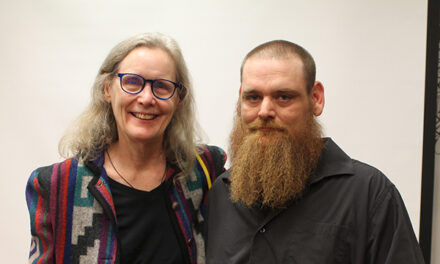For 15 days, Shannarose Martinez waited and prayed.
For 360 hours, she worried and cried.
For 21,600 minutes, her arms were empty.
During those two weeks and a day, Martinez’s 1-year-old son, Matteo, was fighting for his life as an ECMO machine pumped and oxygenated his blood outside his body so his COVID-ravaged lungs could rest.
Everything was fine, until it wasn’t. Matteo had tubes placed in one of his ears on Nov. 30. To have the procedure done, he had to be tested for COVID and it was negative.
After a fussy night spent on the couch at their Belen home with Matteo running a low-grade fever, Martinez decided to go back to The University of New Mexico Hospital’s pediatric emergency room, just to be safe.
“Just to reassure myself. They watched him for a couple of hours and we left about 4 a.m.,” Martinez said.
The family began its day, getting oldest Ehlahn Vestal, 7, off to school, but Matteo just didn’t seem like himself, his mom said. Fatigue, frequent naps and rapid belly breathing told Martinez things weren’t right with her baby.
After seven hours at the ER, with an elevated heart rate, Matteo was admitted and given a battery of tests — for RSV, influenza, COVID and a range of other viruses.
“We had all been so cautious, all vaccinated and boosted. My dad is a transplant recipient and I have a compromised system, so we had been so careful,” she said.
Around midnight, the nurse came in and gave her the news — Matteo had COVID-19.
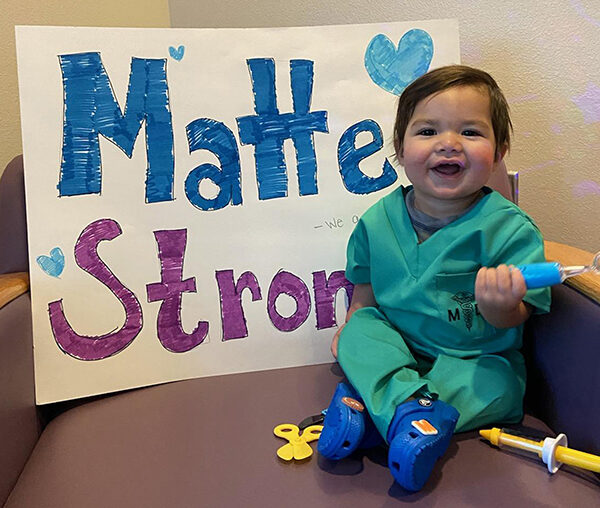
Submitted photo
Getting ready to leave the hospital after 37 days battling COVID-19, Matteo Baca, age 1, reminds everyone that he is #MatteoStrong.
“I felt like my world fell apart. I was in tears. It was hard to accept he had it,” she said.
On oxygen and with a nasogastric tube in place, Matteo was moved to a COVID-safe room at the hospital. That’s where he celebrated his first birthday.
The day after, Dec. 4, he was weened off oxygen and after 12 hours on his own, he was released.
“I wasn’t comfortable going home. They told me I can always come back. I said, ‘I guarantee we will be back,’” Martinez recalled.
That night, her intuition proved correct as Matteo’s condition worsened.
“He would scream and cry any time he coughed. He barely ate, slept all day long,” she said in a shaky voice.
By Dec. 5, they were back at the hospital and his oxygen was at 85 percent. Staff reestablished him on oxygen and put a nasogastric tube in again. For the next few days, it was valleys and peaks — Matteo’s oxygen would drop at night, get better in the day but there was no real improvement.
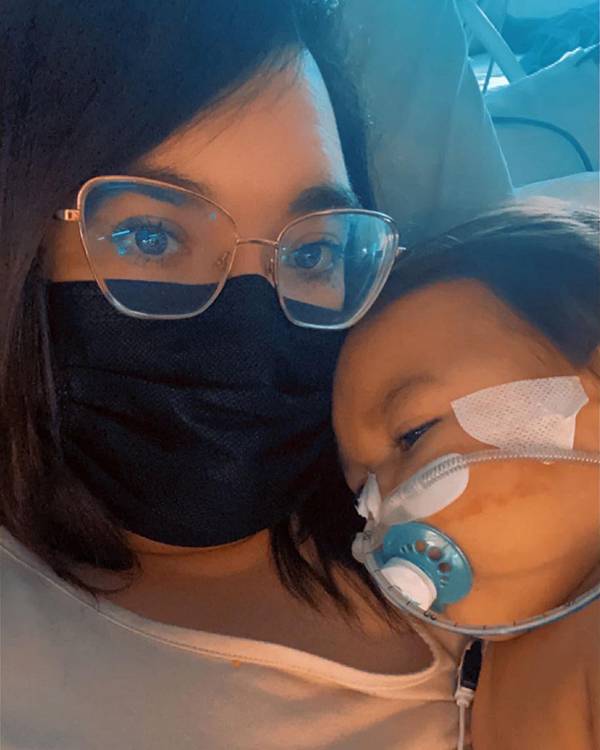
Submitted photo
Shannarose Martinez holds her son, Matteo Baca, 1, during his stay at The University of New Mexico Hospital’s pediatric intensive care unit. The infant was diagnosed with COVID-19 at the end of November and spend more than a month fighting the virus in the hospital.
“When he would cough, he would just scream and cry, look at me like, ‘Help me, Mommy.’”
The morning of Dec. 9, while having his breakfast, Matteo began coughing and couldn’t recover, Martinez said. A nurse was doing deep suction to help but his oxygen was in the low 80s.
Suddenly, five doctors were in the room, Martinez said. Oxygen was flowing fast and at high volume but it wasn’t helping. In the bathroom, Martinez frantically called her family.
They took Matteo to the pediatric intensive care unit, telling Martinez he needed to be intubated.
“I remember thinking, ‘He’s 1. It’s not supposed to be this bad,’” she said.
With his right lung collapsed, Matteo was in need of immediate intervention. Martinez signed the consent form.
“I had to trust the doctors. I remember looking at him and there was no reaction,” she said. “I kept holding him and telling him I love him.”
Martinez watched from outside the room as Matteo was sedated; then doctors placed a chest tube, a central line and put him on a ventilator.
“I lost hope. I didn’t know what to do,” she said, crying. “I was so afraid to even sleep. I would stand next to his bed and cry. ‘Please fight for me.’”
By Dec. 12, doctors told Martinez and Matteo’s father, Raymond Baca, the baby had a 50-50 chance of recovery if they didn’t try the ECMO, which stands for extracorporeal membrane oxygenation. The machine is similar to the heart-lung by-pass machine used in open-heart surgery.
“The doctor told me there were no other options after ECMO. We had to, as parents, put our trust in them,” she said. “There was only an 80 percent chance it would work. I was crying as I was signing the forms. I almost turned back.”
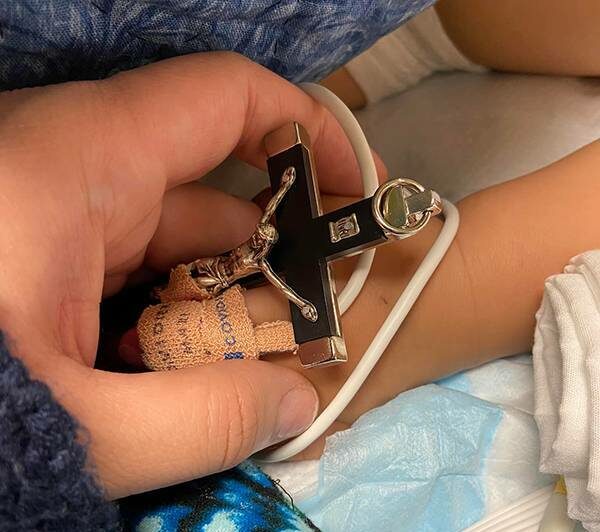
Submitted photo
As her son Matteo Baca, 1, underwent ECMO treatment for COIVD-19, all Shannarose Martinez could do was hold his hand, pray and ask him to breath.
Then Martinez and Baca went through every parents’ nightmare. As doctors were preparing Matteo for the ECMO procedure, he started crashing. His oxygen levels and heart rate plummeted.
“They were yelling for the crash cart. I was standing in the corner, helpless that I couldn’t help my baby. I was screaming, ‘What do I do?!’ Then I saw his body go limp.”
Martinez was taken out of the room as doctors worked frantically to save her baby. It took them an hour to stabilize him and another hour to get Matteo started on ECMO.
When Martinez was allowed back into the room, she was greeted by a scene she says she can never unsee — blood being pumped out of Matteo and back in, his body breathing due to a ventilator.
His oxygen level was at 100, and that gave Martinez joy and hope.
“Every day he got better. They took chest x-rays every day and his lungs were improving. It’s what his body needed,” she said.
After nine days, the doctors began to trial Matteo off the treatment. The first day he was able to go three minutes before his oxygen dropped, Martinez said. Every day, they watched the clock as he went for an hour, three hours and by Dec. 20, he was able to go 24 hours without the ECMO, using only the ventilator on it’s lowest setting.
“When he came off, they deemed him the first infant success story for ECMO in New Mexico. It has been used in other states, but he was the first in New Mexico,” Martinez said. “I felt like, as a mom, because of him, maybe they will be able to save another baby. Maybe this will give hope to another mom.”
After 15 days, Martinez was able to hold Matteo again.
“To love and cradle him. I kept telling him how proud I was,” she said. “My whole world was in pieces and it was back to whole again.
“Christmas Day they brought his oxygen down and that was the best Christmas present. By Monday, he was on minimum air and, by Tuesday or Wednesday, he was completely off.”
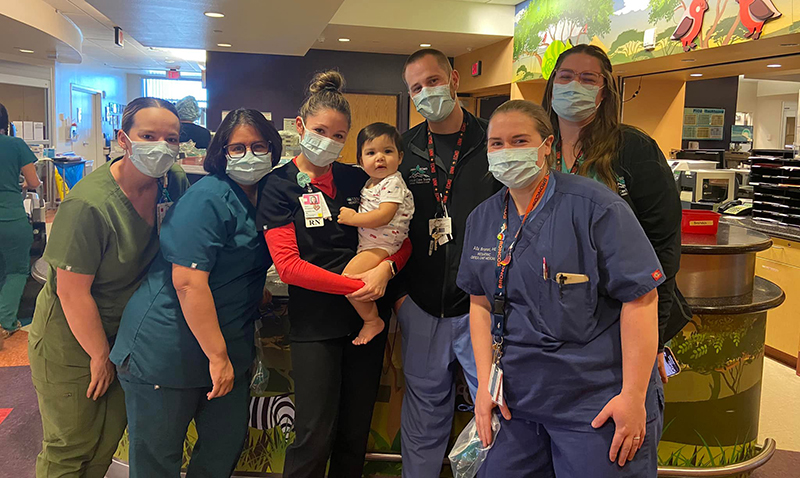
Submitted photo
Matteo Baca, age 1, center, spends time with the group of doctors and nurses, who cared for him during his time at The University of New Mexico Hospital’s pediatric intensive care unit, fighting COVID-19.
After 37 days of fighting, Matteo was released to go home Thursday, Jan. 6.
He is coming back to himself — his eyes sparkle and he’s crawling and taking baby steps. Martinez said he will be part of a new, year-long study on infants that have undergone ECMO with the University of Michigan.
“In adults, people talk about the long-term effects (of COVID) but other than the study, they haven’t expressed concerns,” Martinez said. “I think he will go back to being a very stubborn 1 year old.”
When Martinez started posting about Matteo on Facebook, she said the response was amazing and supportive, from people around Valencia County, the state and country.
“I was getting messages from people I’d never even met. It’s been an amazing road. It has not been easy but it was definitely amazing to have the love and support,” she said. “It made us feel not alone.”
The frame around Martinez’s Facebook profile picture is bright pink with the words, “Disinformation is deadly. Vaccines save lives.”
While her son was in the PICU, Martinez also struggled with COVID-19, feeling light-headed and exhausted. She insisted on staying by his side. Sharing Matteo’s journey and her fears and frustrations publicly was never about being political or even about the vaccine.
“It was just to raise awareness. I think that’s how it reached so many (people),” she said. “It was not about blame. This can happen to anybody. This virus doesn’t care if you’re old or young, healthy or unhealthy. It doesn’t discriminate.”
Many people have asked if the family has an online fund raising platform set up, Martinez said, so the family is using Venmo. Search for user @matteostrong to make a donation.
Julia M. Dendinger began working at the VCNB in 2006. She covers Valencia County government, Belen Consolidated Schools and the village of Bosque Farms. She is a member of the Society of Professional Journalists Rio Grande chapter’s board of directors.

